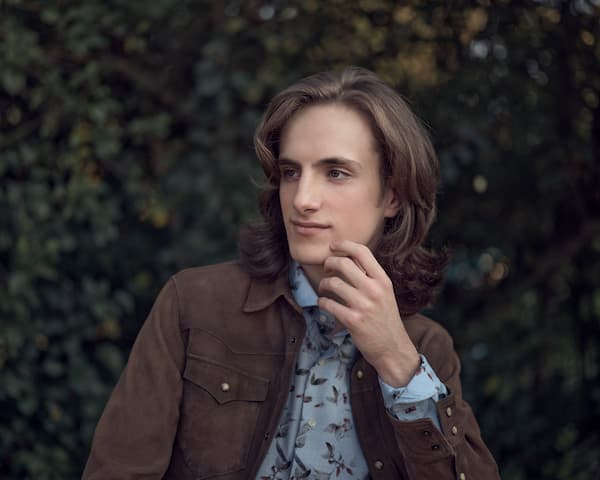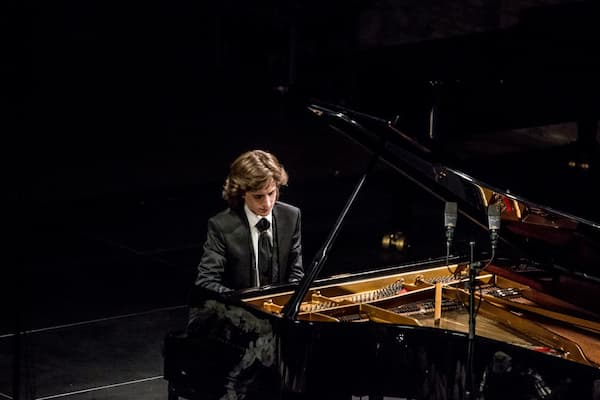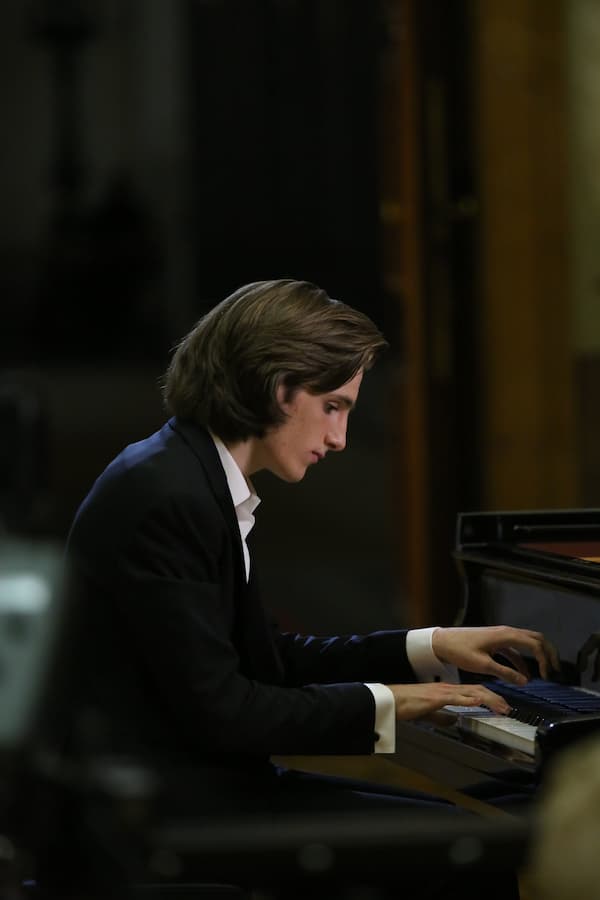Barely into his twenties, pianist Yoav Levanon already boasts a career that any performer twice his age would be proud of. Performances at Carnegie Hall and the Verbier Festival, solo recitals at Martha Argerich’s summer festival and Paris’s Fondation Louis Vuitton, and collaborations with Daniel Barenboim and Murray Perahia, all highly deserved; Yoav’s playing belies a maturity far beyond his years, as does his grounded, down-to-earth attitude.

Yoav Levanon © yoavlevanon.com
In 2021, Yoav signed a record deal with Warner Classics, releasing three albums to date, both to critical acclaim. I caught him the day after recordings finished for his fourth – so hot off the press, in fact, that the specifics can’t be mentioned. Not to worry; there is plenty to discuss from his most recent release, featuring both Liszt’s piano concertos and his fiery Totentanz, along with a piece written by Yoav himself.
Yoav Levanon Plays Liszt: Totentanz, S. 525
How did the Liszt recording come about? What does he mean to you as a composer?
I absolutely love Liszt. Some people might feel that it’s just technical virtuosity, but in my opinion, Liszt is an incredible composer.
There are some pieces that I might have known for years, but it’s when the right moment comes that you make a recording happen. I really try to create a journey for the audience to go through.
When I create a programme that has different colours and that builds up nicely, I have to find something that I really resonate with. I felt like I really wanted to play Liszt and that it was the right time, that I understood it and had something special to show.
It’s really important for me when I play Liszt or any virtuosic piece that this ‘virtuoso’ or technical aspect is just another tool in the artist’s arsenal to be able to express yourself in a different manner. If you play Mozart, you need a specific set of skills, and for Liszt, it’s different. It’s very important not to focus just on the technical aspect. Look beyond it: what the music actually is and what the new possibilities are that you can reach by doing such things.
I found the concept of being able to record Liszt’s concertos fun. I feel there was a lot to be said there, and I like how they’re shorter and the way that they’re composed is very unique. I’m used to playing Liszt from quite a young age, and now I’ve played so many of his pieces. I feel like I have a good connection right now with Liszt.
Liszt: Piano Concerto No.2 – Yoav Levanon, Luzerner Sinfonieorchester, Michael Sanderling
How has your relationship with Liszt changed since you were younger?

© yoavlevanon.com
I would say that it depends. I started playing the piano when I was 3, so I was discovering the world I was discovering myself at the same time. I was growing from being a kid to a man. There was so much stuff happening, and with it, the outlook I had on life and society, everything changed and evolved.
I studied music theory from quite a young age because I think it’s very important to understand what a composer wanted and where their music came from.
With all of that, and naturally, when you grow as a person, and you change and evolve and have more wisdom, obviously, the relationship changes. I wouldn’t say it changes, in fact, but that it evolves and deepens over time.
How did you find your way to the piano when you were 3?
Some of my family were already professional musicians, some more on the amateur side. My mother was a professional violinist, and we happened to have an upright piano at home. I was a kid, so I liked trying out new stuff, so I just tried it, I liked it, and […] from then, it evolved quite gradually.
I didn’t know that I was going to be a professional musician or anything, so I tried other stuff as well. I like that it was gradual and that I never felt pushed to choose it. My parents always asked me if I was sure if I wanted to do it because they knew how demanding the life of a professional musician is.
How was it recording an album with an orchestra for the first time?
I didn’t know what to expect, recording with an orchestra. I’m the kind of person who can play the piano all day long. I arrive at the start of the day, and the more hours you give me, the more I will do, the maximum I can. Similarly, with an orchestra, you need to put everything into every single take.
Listening to a recording is not like sitting in a concert – you don’t know in which environment the person is listening to your recording. And you really have to let it shine through to really make the listener engaged. You really need to put everything into your takes.
What I really loved about the Luzerner Sinfonieorchester is that while they constantly have recordings and spend all day long recording while also doing other things, I still felt like they were putting all their energy into every single take, so that was really amazing.
Do you feel a difference between performing live and ‘performing’ in a recording setting?
I love music but a really important aspect for me is sharing it. I think it’s a very important part of music. It’s what it’s for: it was created to be shared. It evolves over time. You listen, you get inspired, and you create something of your own. It’s really beautiful. I do love to think about what I’m creating, and what impact I’m making, and I try to enrich people’s lives through that.
I remember when I was recording my debut album, I was thinking, ‘Oh my god, it’s incredible that people could be listening for years after this. It’s always there.’
When I go and record something, I feel a huge responsibility to make it really right. You’re putting your signature, your name, on it, and you really want it to be the best it can be because I know it might make an impact, and I know that people who might play this piece in the future will listen to this and be inspired by it.
I feel that, in a sense, it has a bigger impact on history and how music evolves than just doing a live performance.
With that said, I have underestimated how much impact concerts can have. Sometimes, people can remember them for years. I realised how powerful one concert can be. But I just know that a recording is something that people can listen to again and again, and there is no limit to how far it can go.
Yoav Levanon Records Liszt’s La Campanella (from Grandes études de Paganini, S. 141)
Do you have any memories of concerts you yourself attended that made an impact on you?
It’s very important to go to other concerts to better understand the experience as an audience member. I think it’s good to realise that we’re all just people. You listen to your idols: they’re just people. Everyone is imperfect, and that’s what I always encourage people to think because students are so worried about not doing this or that well. We should just do our best and share the music.
Tell us about your own piece that you wrote, Silent Love alla Liszt.

© yoavlevanon.com
A big part of what Liszt did went beyond just being a pianist or a composer: he was entrepreneurial, changing the concept of concerts, of performers, of musicians. He was doing different things, just like how he was helping create the monument to Beethoven in Bonn.
One of the things he would also do is paraphrases or transcriptions of pieces by other people. I was listening to this Hugo Wolf song called Silent Love, and it was created when Liszt wasn’t alive any more. I was thinking to myself how it would sound if Liszt took it, what would happen if he did a paraphrase on that theme? So it’s not a transcription but more a paraphrase.
My piece is heavily inspired by Liszt’s writing and how he was doing things, but I’m not trying to copy the style. It’s heavily inspired by how Liszt would do it. This album is kind of dedicated to Liszt, in a sense, who meant so much to me and still does.
You have collaborated with and been mentored by some great musicians, including Martha Argerich, Daniel Barenboim, and Murray Perahia. What do you take from spending time with these great personalities of the classical music world?
I always view people as people, regardless of what they have achieved. We can respect someone’s achievement, but at the end of the day, we’re all humans; we all come and go, and we’re all the same.
I’m really trying as a person, but also as an artist, to just be myself, to authentically express myself. Not to try to put on any show, not be better, not be more. Not to try to seem sophisticated or smart, because I think the most important thing is just to communicate very directly and very honestly without trying to make a big deal out of things.
If people see something and they appreciate it, then great, but I don’t have to try to present everything in this or that way.
I think it’s very difficult for us musicians. We go on stage, but nobody really ever ‘coached’ us about how to go on stage. You have musicians, you have teachers, you have journalists, who listen to you from the audience, and I know I can play something quicker or faster or do this and that, and it’s really important not to try to impress people, and really focus on what’s right for the music and just do the best for the music, and not worry about making an impression or whatever. Let it happen naturally.
The funny thing is that when you do that, that is when you make the best impression. It’s still difficult, you have to just let go of everything, not think about anyone, just think about the music. When you’re with those people [Argerich and Barenboim], and they’re important, you have to stop worrying about what kind of impression you’re making, how you seem or look. I know there are people who think you have to show that you are this or that, that you know music or this stuff or that, but I don’t try to do any of that. I’m just some 20-year-old kid having fun; that’s it.
For more of the best in classical music, sign up for our E-Newsletter




